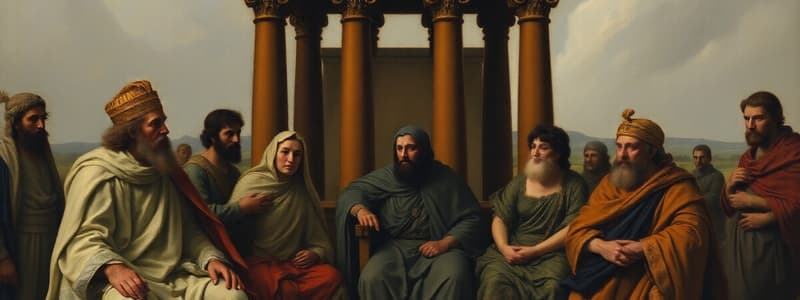Podcast
Questions and Answers
What was a significant concern regarding divine patronage in the context discussed?
What was a significant concern regarding divine patronage in the context discussed?
- It was frequently celebrated in monogamous households.
- It had no impact on freedmen.
- It was largely ignored by scholars.
- It could threaten financial stability. (correct)
What perspective do some modern scholars hold about biblical texts?
What perspective do some modern scholars hold about biblical texts?
- They assume they are universally applicable to all modern contexts.
- They view them solely as historical documents.
- They see them as dangerous artifacts needing deconstruction. (correct)
- They believe they should be treated only as religious artifacts.
Which aspect of historical theology was John L. Thompson particularly interested in?
Which aspect of historical theology was John L. Thompson particularly interested in?
- The legal status of freedmen in society.
- The financial implications of scriptural interpretations.
- The monogamous nature of ancient households.
- Gender issues in Jewish and Christian Scripture. (correct)
What was a key characteristic of freedmen's status in their households?
What was a key characteristic of freedmen's status in their households?
How do modern scholars' approaches to biblical text differ from those of ancient interpreters?
How do modern scholars' approaches to biblical text differ from those of ancient interpreters?
What percentage of the Roman Empire's population belonged to the wealthiest orders?
What percentage of the Roman Empire's population belonged to the wealthiest orders?
Which order comprised the highest political and social rank in the Roman Empire?
Which order comprised the highest political and social rank in the Roman Empire?
What was the principal goal of the freedmen in Roman society?
What was the principal goal of the freedmen in Roman society?
What was the total population estimate of the Roman Empire according to Robert Knapp?
What was the total population estimate of the Roman Empire according to Robert Knapp?
What percentage of the empire's wealth was concentrated among the decurial order?
What percentage of the empire's wealth was concentrated among the decurial order?
Which group was described as stabilizing the day-to-day operations of the Roman Empire?
Which group was described as stabilizing the day-to-day operations of the Roman Empire?
Who controlled the remaining 99.5 percent of the population in the empire?
Who controlled the remaining 99.5 percent of the population in the empire?
What was one of the common social activities enjoyed by freedmen?
What was one of the common social activities enjoyed by freedmen?
What was one perspective of ancient commentators regarding Scripture?
What was one perspective of ancient commentators regarding Scripture?
How did modern critical scholarship change the approach to biblical texts?
How did modern critical scholarship change the approach to biblical texts?
What did Karl Barth distinguish in his commentary on Romans?
What did Karl Barth distinguish in his commentary on Romans?
What challenge did the early church face regarding the Gospels?
What challenge did the early church face regarding the Gospels?
Why is there gratitude owed to the New Testament evangelists?
Why is there gratitude owed to the New Testament evangelists?
What was a key consequence of modern scholarship on biblical texts?
What was a key consequence of modern scholarship on biblical texts?
What did Jesus represent for early Christians according to the conclusion?
What did Jesus represent for early Christians according to the conclusion?
What did earlier scholars aim to achieve when studying biblical texts?
What did earlier scholars aim to achieve when studying biblical texts?
Flashcards are hidden until you start studying
Study Notes
Social Hierarchy in the Roman Empire
- The Roman Empire spanned 2.5 million square miles and had a population estimated at 50-60 million.
- The empire's wealth was concentrated in the hands of a small elite, comprising the senatorial, equestrian, and decurial orders.
- The senatorial order held the highest political and social rank.
- The equestrian order accumulated wealth but did not have the same level of political power as the senators.
- The decurial order governed towns and cities and controlled the majority of the empire's wealth.
Freedmen in the Roman Empire
- Freedmen were former slaves who held a position in society between the elite and the lower classes.
- They contributed to the empire's stability through various professions.
- Financial security, dealing with death and disease, and social activities like entertainment and religious ceremonies were important aspects of their lives.
- They appreciated the value of family and social status.
John L. Thompson
- John L. Thompson is a scholar of historical theology and a specialist in the writings of John Calvin.
- He contrasts modern approaches to biblical interpretation, categorizing them as either viewing the text as an object or feeling personally addressed by it.
- He highlights the difference between modern critical scholarship that focuses on the text's origins and historical context and earlier approaches that emphasized applying the teachings to daily life.
Importance of the Gospels
- The Gospels were written in the last three decades of the first century.
- They preserved early memories of Jesus and provided guidance for Christians.
- They established Jesus as the central figure of Christianity and emphasized the importance of faith in him.
- No single Gospel could fully capture the complexity of Jesus, leading to a multidimensional understanding of him.
Studying That Suits You
Use AI to generate personalized quizzes and flashcards to suit your learning preferences.




